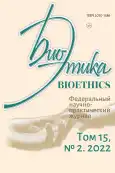Case study of bioethics: a case of improper treatment of bladder exstrophy
- Authors: Tarabrin R.E.1,2, Zolotukhina A.S.1, Afanasyeva A.V.1, Kikhasurova P.M.1
-
Affiliations:
- First Moscow State Medical University named after I.I. I. M. Sechenov
- Sretenskaya Theological Academy
- Issue: Vol 15, No 2 (2022)
- Pages: 18-26
- Section: Practical bioethics
- URL: https://bakhtiniada.ru/2070-1586/article/view/114773
- DOI: https://doi.org/10.19163/2070-1586-2022-15-2-18-26
- ID: 114773
Cite item
Full Text
Abstract
Background: The principles of bioethics proposed by Beechamp and Childress are difficult to apply to the specific ethical dilemmas that arise in clinical practice. The scientific literature has suggested other ways of analyzing them.
Methods: We use the Moscop's case study method to analyze a case of inappropriate treatment of bladder exstrophy, a rare congenital condition associated with a high chance of medical error during treatment.
Results: The analysis of the present case of a medical mistake considers ethical aspects such as the doctor-patient relationship, the reaction of physician-colleagues and the patient to the medical mistake, and the disclosure of the medical mistake. As a result of the bioethical analysis of the case, the following recommendations have been formed: 1) Despite the objective difficulties of treatment in a low-profile regional center and bureaucratic mechanisms of referral of the patient to another institution, the doctor should respect the autonomy of the patient and his relatives, for which full information about possible risks and treatment alternatives should be provided; 2) Disclosure of the true causes of medical error and apology can help to build trusting relationships with the patient and reduce subsequent conflicts. Short-term psychological discomfort of disclosure will be compensated by long-term positive results of interaction with patients; 3) Criticism of previous treatment should take into account possible difficulties of diagnostics at regional level and lack of experience in treatment of rare pathologies. Achieving an advantage over one's colleagues through pointing out their medical error without knowing the real reasons for the prior treatment is ethically unjustified.
Conclusion: An important function of disclosing medical errors is to warn colleagues against such errors. Most authors are of the opinion that it is the professional duty of a doctor who witnesses an adverse event to assist in the disclosure of an error and help in minimizing its consequences, however, in a medical environment with strong corporate ties and cultivating a spirit of solidarity, this principle has not become widespread in practice.
Full Text
##article.viewOnOriginalSite##About the authors
Roman E. Tarabrin
First Moscow State Medical University named after I.I. I. M. Sechenov; Sretenskaya Theological Academy
Email: romanscript@yandex.ru
ORCID iD: 0000-0002-5390-9205
assistant of the Department of Humanities; Lecturer, Department of Practical Disciplines
Russian Federation, Moscow; MoscowAnastasia S. Zolotukhina
First Moscow State Medical University named after I.I. I. M. Sechenov
Email: romanscript@yandex.ru
ORCID iD: 0000-0002-7982-0006
student of the Faculty of Medicine
Russian Federation, MoscowAnastasia V. Afanasyeva
First Moscow State Medical University named after I.I. I. M. Sechenov
Email: romanscript@yandex.ru
ORCID iD: 0000-0001-8433-5411
student of the Faculty of Dentistry
Russian Federation, MoscowPatimat M. Kikhasurova
First Moscow State Medical University named after I.I. I. M. Sechenov
Author for correspondence.
Email: romanscript@yandex.ru
ORCID iD: 0000-0002-5739-8393
student of the Faculty of Dentistry
Russian Federation, MoscowReferences
- Beauchamp and Childress. Principles of Biomedical Ethics. 8th ed. Oxford University Press, 2019.
- Engelhardt. The Foundations of Bioethics. 2nd ed. Oxford, 1996.
- Gudorf C.E. A Feminist Critique of Biomedical Principlism. A Matter of Principles? Ferment in US Bioethics. E.R. DuBose, R.P. Hamel & L.J. O’Connell (Eds.). Valley Forge: Trinity Press International. 1994:164–181.
- Moskop J. Ethics and Health Care. Cambridge University Press, 2016.
- Tarabrin R.E., Shok N.P. Fundamentals of clinical bioethics: case analysis: Scientific and methodological materials. Moscow: Practical medicine, 2021. 96 p. (in Rus.).
- Sidorovich Yu.S. Civil liability for medical error: dissertation of a candidate legal sciences. 2005. 32 p. (in Rus.).
- Fomina T.K. Attitude to the problem of medical error in the media. Meditsinskiy vestnik Bashkortostana = Medical Bulletin of Bashkortostan. 2008;3(6):11–13. (in Rus.).
- Blendon R.J. et al. Views of practicing physicians and the public on medical errors. New England Journal of Medicine. 2002;347(24):1933–1940.
- Krasnopeeva M.K. Modern medical errors, statistics of lethal outcomes in Russia. Problemy sovremennoy nauki i obrazovaniya = Problems of modern science and education. 2017;34(116):78–80. (in Rus.).
- Lo B. Resolving Ethical Dilemmas. 6th ed. Philadelphia, USA: LWW, 2019.
- Rudin Yu.E. Epispadias and bladder exstrophy. Urology. National leadership. Ed. by N.A. Lopatkina. Moscow: GEOTAR-Media, 2009;273–293. (in Rus.).
- Rudin Yu.E. et al. The volume of surgery for the primary closure of the bladder in children with bladder exstrophy. Detskaya khirurgiya = Pediatric surgery. 2020;24(1):21–28. (in Rus.).
- Clinical guidelines. Bladder exstrophy: standards of patient management for physicians (paramedics). Ed. advice: A. A. Baranov et al. Moscow: GEOTAR-Media, 2015. (in Rus.).
- Akhunzyanov A. A., Rashitov L. F., Takhautdinov Sh. K. Treatment and rehabilitation of bladder exstrophy. Kazanskiy meditsinskiy zhurnal = Kazan Medical Journal. 2005;86(3): 250–255. (in Rus.).
- Gallagher T.H., Levinson W. Revealing harmful medical errors to patients: time for professional action. Arch Intern Med. 2005;165:1819–1824.
- Witman A.B., Park D.M., Hardin S.B. How do patients want physicians to handle mistakes? A survey of internal medicine patients in an academic setting. Archives of Internal Medicine. 1996;156(22):2565–2569.
- Makary M.A., Daniel M. Medical error – the third leading cause of death in the US. Bmj. 2016;353.
- Waterman A.D. et al. The emotional impact of medical errors on practicing physicians in the United States and Canada. The Joint Commission Journal on Quality and Patient Safety. 2007;33(8):467–476.
- Campbell S.M., Ulrich C.M., Grady C. A broader understanding of moral distress. Moral distress in the health professions. Springer, Cham, 2018:59–77.
- Runciman W. B., Merry A. F., Tito F. Error, blame, and the law in health care-an antipodean perspective. Annals of Internal Medicine. 2003;138(12):974–979.
- Lone B. Lost art of healing. Moscow: Kron-press, 1998. (in Rus.).
Supplementary files







